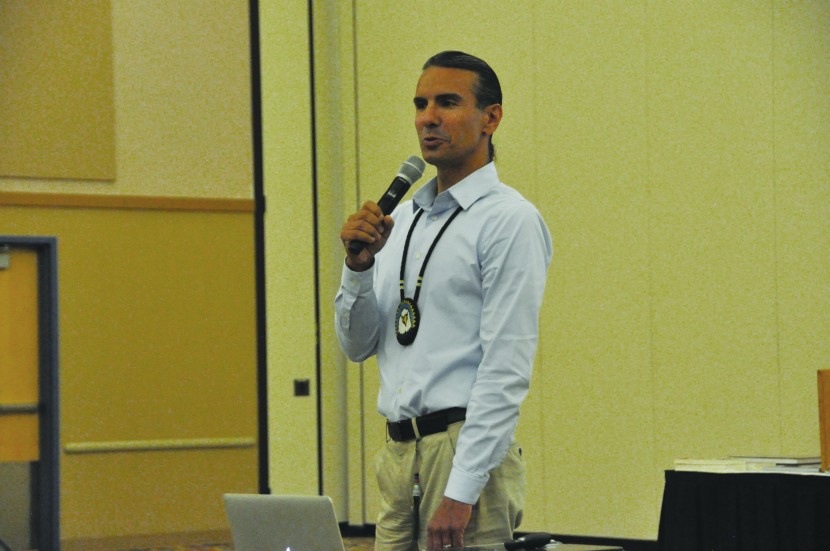
Brett Larson Staff Writer
Dr. Anton Treuer came to Mille Lacs June 28 for a thought-provoking presentation on culture, language and traditional tobacco.
The event was sponsored by the Tribal Tobacco Prevention Grant through the Mille Lacs Band Public Health Department.
Anton, a Leech Lake Band member and professor at Bemidji State University, shared stories from his childhood on the Leech Lake Reservation near Bena. His father was a Jewish, Austrian Holocaust survivor and his mother the rst fe- male Native American attorney in Minnesota.
He also talked about what he learned from Elders like Archie Mosay, Tom Stillday and Jim Clark as he pursued an education in Ojibwe language and culture.
Anton said he once asked Jim Clark why the Mille Lacs Band was able to retain its traditions, even though it was a small, poor tribe close to the Twin Cities. Jim gave credit to tobacco.
“The Mille Lacs Band had a really tenacious belief in cultural practice,” Anton said.
“When we make a request, harvest a plant, or take life of animal, we need to pay it forward. We can’t just be takers. Tobacco is our tool for paying it forward. That’s how we are supposed to live: not like we are the masters of the web of life, but like we are part of the web of life. And that’s why we use tobacco.”
One theme of his talk was the balance between cultural continuity and cultural change, and the lack of a “rule book” for Anishi- naabe culture. He said it’s difficult to talk about a “right” or “wrong” way to use tobacco or conduct a drum ceremony.
That “spiritual empowerment” can be liberating and beautiful, but it also causes confusion, he said. “The Ojibwe people, we’re re- ally libertarian. We place a high value on being free and not having a rule book, so much so that if someone became too bossy, some- one else was moving down the river and saying ‘They’re not my chief.’ We’re tolerant within the community but not tolerant about being told what to do.”
The importance of politeness can make it difficult to ask others not to smoke, he said, but he recommended that “pleasure smoking” be done outside of ceremonial buildings.
He also advocated for the use of traditional tobacco made from red willow or red dogwood.
“Our tobacco use has been colonized and commercialized,” he said. “We have to get it from the white man, and it has hundreds of addictive, cancer-causing chemicals. Our indigenous tobacco has no tar, no nicotine, no addictive properties, no toxins, it grows everywhere, and it’s easy to access.”
He said it has more significance when you offer tobacco to the plant before harvesting it, and it has more meaning when you put work into it. “As a matter of spiritual power, we have to do a little decolonizing,” he said. “We’ve been trained to do things the cheapest, fastest, most convenient way. What would happen if we turned our thinking around?”
Anton introduced himself in Ojibwe and stressed the importance of language preservation, but said it’s important to note that no one is trying to “out-Indian” anyone by using the language. “We have to make space to use it, or it won’t be used. We have to make space for kids to hear it, or they won’t hear it.”
He cited the example of Hawaii, where language use had dwindled until there were only 1,000 native speakers, but now there are 22,000 speakers, 3,000 of whom learned Hawaiian in the home as their first language.
Preservation of language and culture can create a healthy environment, which can help fight addiction and other negative behaviors.
Anton emphasized how remarkable it is that Anishinaabe culture and language have survived genocide, boarding schools and government policies of termination. “It’s pretty impressive that we’re still speaking Ojibwe and doing these ceremonies,” he said.
“What we don’t talk about enough is that we are more than the sum of our tragedies. It’s not just the bad things that got passed forward; it was the good things that got passed forward, too.”